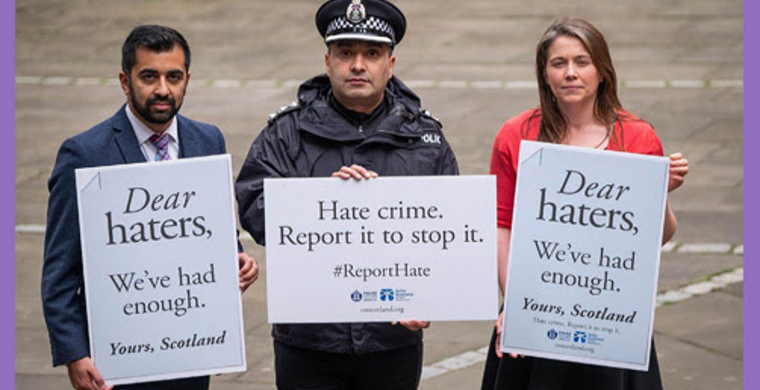If the SNP's 'Hate' Bill becomes law, Scots' freedom of religion will end
Archbishop Cranmer
Aug. 10, 2020
The SNP's Hate Crime and Public Order (Scotland) Bill is currently wending its way through the committees and procedures of the Scottish Parliament. It provides for the modernising, consolidating and extending of hate crime legislation in Scotland. "Legislation in this area has evolved over time in a fragmented manner with the result that different elements of hate crime law are located in different statutes", the Scottish Government explains. "There is a lack of consistency, and the relevant legislation is not as user-friendly as it could be."
The crime of stirring up hate is currently restricted to race, so, in order to make hate crime law more "user-friendly", the SNP intend to extend the scope to include other protected characteristics: age, disability, religion, sexual orientation and transgender identity, and variation in sex characteristics. If someone expresses "prejudice or hostility" toward a person or group of persons because of these characteristics, they will be guilty of stirring up hate. And 'hate' is what is deemed to be offending behaviour or conduct whether or not the offender intended to threaten or cause offence:
The Scottish Government accepts that to confine a stirring up offence to an intention to stir up hatred would be prohibitively restrictive in practice as in real-life cases it may often be very difficult to prove beyond reasonable doubt what the accused's intent was, even where it is very clear that their behaviour would be likely to result in hatred being stirred up.
So any abusive conduct which was not threatening, and any abusive behaviour which was not intended to cause offence, could still stir up hatred in relation to a characteristic. If a person's conduct or behaviour could give rise to the likelihood that hatred could be stirred up, it will constitute a breach of the law.
Now, one person's joke by word or gesture is another person's abusive speech or behaviour, so stand-up comedy on the Edinburgh Fringe is in peril. And it's unlikely you'll see Shakespeare's 'Merchant of Venice' ever staged again in Scotland, or, indeed Marlowe's 'Tamburlaine the Great', which excoriates Mohammed and requires the onstage burning of the Qur'an.
The Bill also proposes to outlaw possession of "inflammatory material", so there is some concern that this might extend to the Bible and a Catechism of the Roman Catholic Church. No-one seems to have dared to write about what this mean for the Qur'an and Hadith.
You might insist (as the SNP do) that European Convention on Human Rights protects everyone's right to freedom of expression (Article 10) and freedom of religion (Article 9), so there is no question of these fears being realised, but the architects of the Bill explain:
...not all interferences with a person's freedom of expression are incompatible with Article 10. In some circumstances the European Court of Human Rights has held that what can be considered 'hate speech' is not protected by Article 10 by virtue of the application of Article 17 of the Convention (the prohibition on the abuse of rights). The Court has held that in some cases the expression is contrary to the 'values proclaimed and guaranteed by the Convention, notably tolerance, social peace and non-discrimination.
In other cases, where Article 10 does apply, expression which is protected can be lawfully interfered with by virtue of Article 10(2). 295. Article 10(2) provides that an interference with Article 10 rights can be justified if the interference is prescribed by law and necessary in a democratic society in the interests of one or more specified legitimate aims. These aims include measures taken for the prevention of disorder or crime and for the protection of the reputation or the rights of others.
So, under the pretext of community cohesion and social peace, Scotland's freedoms of expression and religion are to be curtailed, if not nullified. If preaching the gospel is likely to cause offence and stir up hate, it will be prevented in order to protect the rights of others to protect public order. What freedom of expression remains if one may no longer offend? What freedom of religion is there if one may only preach about gentle Jesus and mild benevolence?
And I, brethren, if I yet preach circumcision, why do I yet suffer persecution? then is the offence of the cross ceased (Gal 5:11).
If the sinner may no longer be told about the depravity of their human nature and that they are lost in their sin and need to repent or else be damned for all eternity, then is the cross of Christ abolished in Scotland. There can be no fear and trembling, no knocking knees, no shaking of the ground, no thunder and lightning: the wrath of God is emotionally, spiritually, physically and intellectually disturbing, and so likely to cause offence and stir up hate -- especially to those who are being lost. How, then, are Scots to be saved if they may no longer hear?














